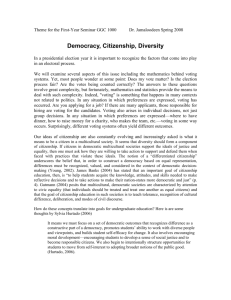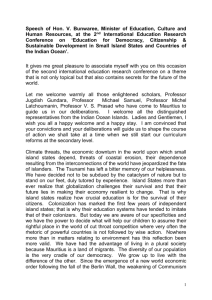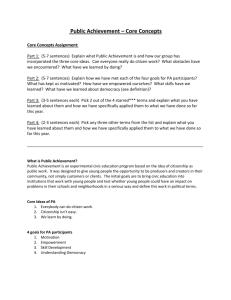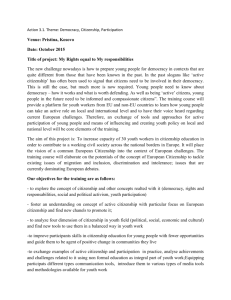the course`s broad aims - OISE
advertisement
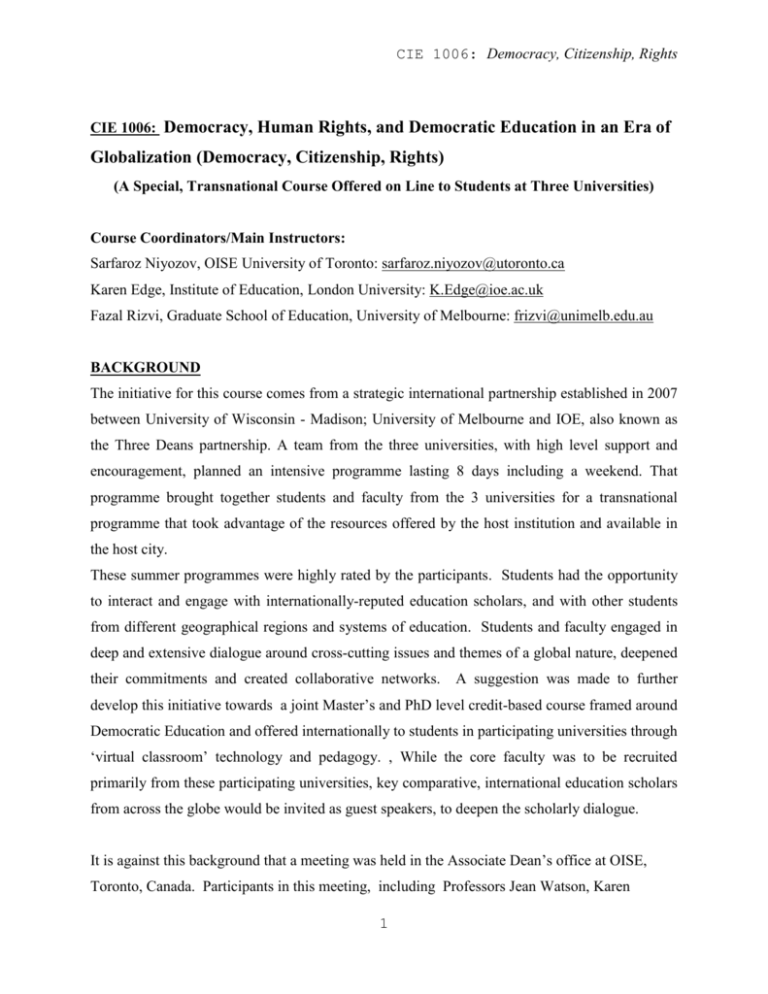
CIE 1006: Democracy, Citizenship, Rights CIE 1006: Democracy, Human Rights, and Democratic Education in an Era of Globalization (Democracy, Citizenship, Rights) (A Special, Transnational Course Offered on Line to Students at Three Universities) Course Coordinators/Main Instructors: Sarfaroz Niyozov, OISE University of Toronto: sarfaroz.niyozov@utoronto.ca Karen Edge, Institute of Education, London University: K.Edge@ioe.ac.uk Fazal Rizvi, Graduate School of Education, University of Melbourne: frizvi@unimelb.edu.au BACKGROUND The initiative for this course comes from a strategic international partnership established in 2007 between University of Wisconsin - Madison; University of Melbourne and IOE, also known as the Three Deans partnership. A team from the three universities, with high level support and encouragement, planned an intensive programme lasting 8 days including a weekend. That programme brought together students and faculty from the 3 universities for a transnational programme that took advantage of the resources offered by the host institution and available in the host city. These summer programmes were highly rated by the participants. Students had the opportunity to interact and engage with internationally-reputed education scholars, and with other students from different geographical regions and systems of education. Students and faculty engaged in deep and extensive dialogue around cross-cutting issues and themes of a global nature, deepened their commitments and created collaborative networks. A suggestion was made to further develop this initiative towards a joint Master’s and PhD level credit-based course framed around Democratic Education and offered internationally to students in participating universities through ‘virtual classroom’ technology and pedagogy. , While the core faculty was to be recruited primarily from these participating universities, key comparative, international education scholars from across the globe would be invited as guest speakers, to deepen the scholarly dialogue. It is against this background that a meeting was held in the Associate Dean’s office at OISE, Toronto, Canada. Participants in this meeting, including Professors Jean Watson, Karen 1 CIE 1006: Democracy, Citizenship, Rights Mundy, Stephen Anderson, Barbara Bodkin and Sarfaroz Niyozov, discussed and endorsed a proposal to develop a collaborative internationally-run, internationally-attended ‘virtual’ course entitled Democracy, Human Rights and Democratic Education in an Era of Globalization. The lead professors for the coordination of this course include: Sarfaroz Niyozov, OISE; Fazal Rizvi, Graduate School of Education, University of Melbourne; and Karen Edge, IoE, London, . It was proposed that the course be piloted in the Winter of 2014 (without credit) and followed by a credit–based course in the Fall of 2014. This graduate level course would be open to Master’s and PhD students in areas relevant to Democracy, Human Rights and Democratic Education in an Era of Globalization including, but not limited to: philosophy, history of education, comparative education, social justice, sociology of childhood and children’s rights, development education, and policy studies. RATIONALE Globalization, trans-nationality, fast and free flow of ideas, “best practices” epistemologies and value systems in multiple directions require appropriate and innovative approaches of engagement. Concepts, strategies and ideas used in education have never become so contested and unstable. Global education solutions take various forms and manifestations in various contexts and are used to serve multiple, at times, contradictory aims. Various education schools understand and explain the nature, aims, approaches and articulations of global ideas in different ways and to different ends. There is an increasing need within higher education courses which promote critical and pluralistic engagement with various perspectives on the cross-cutting themes within democratic education. Currently, there is no course of such nature, ambition, scope and pedagogy within international programs of comparative and international education that would bring cutting edge education and humanities scholarship together to deal with the challenges emerging from the proliferation of the global themes and strategies in education and society. It is to this end that this course has been conceived and proposed. At the meeting at OISE’s Associate Dean’s office this importance was highlighted and endorsed and OISE commitment was made. THE COURSE’S BROAD AIMS To explore: 2 CIE 1006: Democracy, Citizenship, Rights National and transnational perspectives on Democracy, Human Rights and Democratic Education in an Era of Globalization drawing on experience and scholarship from three continents. To provide opportunities for in-depth engagement both with leading scholars acting as faculty and with students from other universities. To build networks of students and faculty to scholarly address the articulation of democratic education not just in the context of the three mentioned countries, but also globally. Learning Outcomes By the end of the course students will be able to: o Engage with key concepts relevant to democratic education such as: democracy, citizenship, human rights, antiracism, discrimination, equalities; o Interrogate transnational research and scholarship on Democracy, Human Rights and Democratic Education in an Era of Globalization, using a variety of perspectives including sociology, political science and pedagogy; o Critically evaluate and compare different national and international approaches to democratic citizenship education; o Apply understandings of democracy and human rights to educational contexts; o Develop and implement policies and programs for democratic education. PEDAGOGY OF THE COURSE This course is open to M A and PhD students. To ensure fairness of admission, students will be asked to present a half-page rationale substantiating why this course is highly relevant and important to their M. A., or PhD projects. The overall course organization will be coordinated by professors Fazal Rizvi (Melbourne Graduate School of Education); Karen Edge (IoE London University); Sarfaroz Niyozov (OISE, University of Toronto). These will be working on permanent basis. In addition, each school of education will suggest a number of faculty/professor as guest speakers in the area broadly defined as Democracy, Human Rights and Democratic Education in an Era of Globalization. From the pool of professors put forward, the coordinators of the course will select 3 to 4 for each offering of the course. This selection will be 3 CIE 1006: Democracy, Citizenship, Rights based on the relevance of the professors’ work to the course content and to students’ needs analysis. Course enrolment will be set at a maximum of 36 students, with a representation of 12 students from each of the participating universities. The course will be offered on-line. Given the time difference between Toronto, London and Melbourne, each of the 12 sessions will be conducted over a 2 hour time slot, without break. Sessions will be recorded and stored on the course learning portal to enable students who were unable to attend a session the opportunity to review. At OISE the classes will run from 3 pm to 5pm; In London from 8 pm to 10 pm; and in Melbourne 8 am to 10 am. The major mode of teaching will be in seminar/dialog format. Each session presenter (coordinators and guest speakers) will be offering a brief lecture, up to 15 minutes, highlighting key issues around the topic of their scholarship. The rest of the class will be based on various forms of critical dialogue and discussion (individual, group and whole class active learning activities). The speakers will also provide 2 to 3 readings (one from their publications and 2 others from other scholars’ works. These will be distributed prior to the session and will be available on the online forum).There will be an ‘asynchronous’ component to this course, where students will be asked to ‘continue the dialogue, engage with readings &/or presentations’ (through Reading Responses or Graphic Organizers, etc.). These would be posted for other students/professors to comment on or engage further with on line forum. Building on course participants’ motivation, interest and/or experience in cross-cultural learning, teaching, research, and international work, the course will follow a dialogical approach in order to constructively engage the participants’ values, practices, assumptions, and beliefs from their life and work experiences. Based on the primacy of dialogue, each topic/session is expected to ensure that the participants’ personal knowledge, the readings, and the instructors’ knowledge are brought into synthesized and integrated learning outcomes. Instructional variety (seminars, pair/group discussions, lectures, guest speakers, video-recordings) and intellectual challenge are the key elements in the course’s pedagogy. Reflection, cooperative learning, an inclusive classroom ethos, critical thinking, social skills development, a culture of encouragement, and reciprocal sharing and learning are a must for each session. The specific strengths of the proposal are the quality and commitment of the faculty involved; the opportunity to work with a transnational group of students and faculty. 4 CIE 1006: Democracy, Citizenship, Rights EXPECTATIONS AND EVALUATION Students attending Melbourne and London universities’ school of education graduate (Ph D) students are not graded, however, OISE has very clear assessment policy. To that end students from OISE will be graded according to University’s policy and the course will be credited as cross departmental course, giving the students credit for their departmental degree requirement as well as for the CIDE certificate requirement. Grades will be based on the work produced collectively and individually within the course. A grade of A+ is appropriate for work that is publishable, as is, or with minor revisions. An A+ grade indicates work that makes a significant contribution to the literature on a topic. A grade of A is earned by work that makes coherent and original analyses of issues and/or syntheses of research and theory on particular topics. A grade of A- is given for work that is competent and accurately reports the research and theory in a particular area but which is not characterized by original insights. Written work is expected to conform to the standards of the American Psychological Association. Please refer to the APA Style Manual (6th Ed.). For examples of APA papers, formatting, citations, reference lists etc., http://owl.english.purdue.edu/owl/resource/560/01/ is a good resource. The following criteria/assignments will be used for assessment/ evaluation: 1. Prepared, Active, and On-line Participation (10%) The above approach requires students to attend classes having read, compared, reflected on and responded to the literature assigned to you by the instructor each week. Students are expected to participate actively in classroom discussions and on the Blackboard or C2C discussion board by offering ideas, participating in group presentations, asking questions, constructively challenging themselves, their classmates, and the instructor, and by suggesting resources and creative ideas about the course content and pedagogy, and responding critically and constructively to the posts of others. Attendance, participation and preparedness are a key to our knowledge development, as well as to the course’s success, and are the main criteria for this component of evaluation. If students cannot attend a session, please inform the instructor (and group members). 2. Ten Critical and Creative Reflections on the Readings (30 %) Students’ individual reflections are due before each class. These reflections should reflect their key learning from the class readings and sessions. Critical analysis of the readings, as well as creative 5 CIE 1006: Democracy, Citizenship, Rights forms of presenting their readings will be the key criteria for assessment. Overall students are expected to submit 10 reflections each succeeding no more than 2 pages (500 words). 3. Comparative Summary on the Readings/ Presentations (20%) This is a pair (group) assignment, due by the 7th session. The summary should be no longer than four pages (1000 words). It should provide a comparative critical analysis of a related theme in two geographic contexts provided in the course syllabus. Half or the first page of the summary should be devoted to the method, i.e., how the comparative analysis was done (i.e., criteria, methods/concepts, matrixes used for the comparison). The heart of the paper should contain a critical application of this method/framework to a key relevant theme the two papers/pieces not with the purpose of taking a side (which is also an option), but of developing a third position that is based on (i) synthesizing the two papers/pieces and (ii) connecting that with your personal experience. The last half page should highlight implications of the comparative analysis of the theme under analysis for Democracy, Human Rights and Democratic Education in an Era of Globalization. The summary should be posted on online discussion board. Other students are invited to constructively respond to these summaries. 4. Major course paper (40%) This individual paper should directly relate to one of the major themes or issues related to the course curriculum. It must be of comparative international education nature, where a theme of the course is analyzed in more than one context. Expected maximum length is 20 pages (double spaced). Final paper is due a week after last session, i.e. after session 12. As the final paper in lieu of a final examination, it must be submitted before or on the date specified. Please submit with a stamped, addressed envelope for return. Papers must not be submitted electronically. NOTE: In the University of Toronto Code of Behaviour on Academic Matters, it is an offence for a student to represent as one’s own any idea or expression of an idea or work of another in academic examination or term test or another form of academic work. Whether quoting original work or adapting it, always cite the source. For reference, see the handouts “How Not to Plagiarize” and “Standard Documentation Format” at www.utoronto.ca/writing/plagsep.html www.utoronto.ca/writing/document.html. SUMMARY OF COURSE CURRICULUM (Including outline session titles) 6 and CIE 1006: Democracy, Citizenship, Rights Note: Given the sheer number of themes and issues, plus well –known scholars in the area, the course syllabus will have some ‘common themes’, but will also ensure flexibility to include ‘emerging themes’ and relevant speakers based on course evaluation and student feedback. It is critical that students be exposed to a variety of themes and scholars and gain maximum benefit from the course. For the initial offering, the 2014 Fall course will feature the following themes and scholars. Platform: Adobe Connect Session 1: Introduction –Forum (Sarfaroz Niyozov, Fazal Rivi, & Karen Edge ) Session 2: Melbourne (Guest: Julie McLeod) Globalization and Youth Culture Readings 1: 2: Session 3: OISE (Guest: George Dei): Global Education from an ‘Indigenist Anti-Colonial’ Perspective Readings: 1. Dei, G. J. S. (2012c). Democratic Education: Thinking Out Differently. In. P. Carr & A. Abdi (Eds.). Educating for Democratic Consciousness: Counter Hegemonic Possibilities (pp.50-67). New York: Peter Lang. 2. Golmohamad, M. (2008). “Global Citizenship: From Theory to Practice, Unlocking Hearts and Minds.” In Peters, M. A., A. Britton, & H. Blee (Eds.) Global Citizenship Education: Philosophy, Theory and Pedagogy (pp. 519-533). Rotterdam, The Netherlands: Sense Publishers. 3. Dei, G. J. S. 2013 “Global Education from an ‘Indigenist Anti-Colonial’ Perspective”. Journal of Contemporary Issues in Education [forthcoming]. Session 4 Readings London (Guest) Human Rights? 1: 2: Session 5: Melbourne (Guest: Jo Lo Bianco): Global English and Global Chinese Readings 1: 2: Session 6: OISE (Guest: Kathy Bickmore): Conflict, Peace-building, Security, and 'Citizenship' Education Readings: 7 CIE 1006: Democracy, Citizenship, Rights 1. Novelli, Mario & Mieke Lopes Cardozo (2008), “Conflict, education and the global south: New critical directions.” International Journal of Educational Development 28, 473-488. 2. Lederach, John Paul (2006). Defining Conflict Transformation. Peacework 33(368, September), 26-27. 3. Bickmore, Kathy. (2011). Policies and programming for safer schools: Are ‘antibullying’ approaches impeding education for peacebuilding? Educational Policy, 25(4), 648687. Recommended: Bush, Kenneth & Saltarelli, Diana (2000). The Two Faces of Education in Ethnic Conflict: Towards a Peacebuilding Education for Children. Florence, IT: UNICEF Innocenti Research Centre (esp. chapters 2-4). Session 7: Readings London (Guest) 1: 2: Session 8: Melbourne (Guest: Nikos Papasgiaridis) Turbulence of Global Mobility Readings 1: 2: Session 9: OISE (Guest: Mark Evans): Educating for the "global dimension" of citizenship in schools: Perspectives, practices, and contexts Readings: 1. Davies, L. (2006) Global citizenship: Abstraction or framework for action, Educational Review, 58 (1), 5-25. 2. Evans, M., Ingram, L., MacDonald, A., & Weber, N. (2009) Mapping the global dimension of citizenship education in Canada: The complex interplay between theory, practice, and context. Citizenship, Teaching and Learning, Volume 5 (2), 16-34. 3. Shultz, L. (2007) Educating for global citizenship: Conflicting agendas and understandings. The Alberta Journal of Educational Research, 53 (3), 248 – 258. Session 10: Readings Melbourne ( Fazal Rizvi) 1: 2: Sessions 11: Readings London (Guest: xxxxx) 1: 8 CIE 1006: Democracy, Citizenship, Rights 2: Session 12: Summing Up –Forum (Sarfaroz, Fazal & Karen) The list of the other scholars/guests from OISE includes: Sarfaroz Niyozov (Globalization, and the Use and Abuse of the Global “Best Practices & Universal Values”: The Case of and Education in Central Asia). Karen Mundy (Transnational Civil Society in Education) Monica Heller and/or Ruben Gaztambidi-Fernandez (Youth, Culture and Identity?) Reva Joshee (Democratic approaches to policy and education; Diversity, Social Justice), Rinaldo Walcott ( Youth and Identity) These subsequent or additional classes will be arranged as required by each of London, Melbourne and OISE. 9


